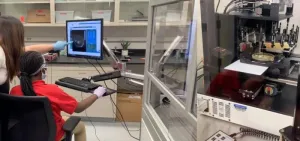(Press-News.org) McGill University scientists have discovered that pregnancy may trigger a natural immunity to boost protection against severe flu infection.
Contrary to the common belief that pregnancy increases vulnerability to infections, researchers found that it strengthened an immune defense in mice, blocking the Influenza A virus from spreading to the lungs, where it can cause severe infection.
“Our results are surprising because of the current dogma, but it makes sense from an evolutionary perspective,” said co-lead author Dr. Maziar Divangahi, Professor in McGill’s Faculty of Medicine and Health Sciences and Senior Scientist at the Research Institute of the McGill University Health Centre (The Institute).
“A mother needs to stay healthy to protect her developing baby, so the immune system adapts to provide stronger defenses. This fascinating response in the nasal cavity is the body’s way of adding an extra layer of protection, which turns on during pregnancy.”
Exploring benefits for pregnancy and beyond
The researchers used a mouse model to observe how a certain type of immune cell activates in the nasal cavity of mice during pregnancy, producing a powerful molecule that boosts the body’s antiviral defenses, especially in the nose and upper airways.
“Influenza A virus remains among the deadliest threats to humanity,” said first author Julia Chronopoulos, who carried out the research while completing her PhD at McGill. “This natural immunity in pregnancy could change the way we think about flu protection for expectant mothers.”
The Public Health Agency of Canada recommends pregnant women and pregnant individuals get the flu vaccine, as they are at high risk of severe illness and complications like preterm birth. The new insights offer promise for more targeted vaccines for influenza, which is among the top 10 leading causes of death in Canada.
“The broader population could also benefit, as our findings suggest the immune response we observed could be replicated beyond pregnancy,” said co-lead author Dr. James Martin, Professor in McGill’s Faculty of Medicine and Health Sciences and Senior Scientist at the RI-MUHC. This could mean new nasal vaccines or treatments that increase protective molecules, known as Interleukin-17.
The team’s next focus is on finding ways to reduce lung damage during viral infections like the flu or COVID-19. Rather than targeting the virus, as previous research has done, they aim to prevent dysregulated immune systems from overreacting, an approach that could lower the risk of serious complications associated with flu infection.
The research was funded by the Canadian Institutes of Health Research.
About the study
“Pregnancy enhances antiviral immunity independent of type I IFN but dependent on IL-17–producing γδ+ T cells in the nasal mucosa” by Julia Chronopoulos, Maziar Divangahi, and James G. Martin was published in Science Advances.
END
Pregnancy enhances natural immunity to block severe flu
Scientists discover a natural flu defense mechanism that activates in the nasal cavity during pregnancy
2024-12-02
ELSE PRESS RELEASES FROM THIS DATE:
Deep-sea marvels: How anglerfish defy evolutionary expectations
2024-12-02
A groundbreaking Rice University study sheds light on the extraordinary evolution of anglerfish, a group of deep-sea dwellers whose bizarre adaptations have captivated scientists and the public alike. The research, published in Nature Ecology & Evolution, uncovers how these enigmatic creatures defied the odds to diversify in the harsh, resource-poor environment of the bathypelagic zone — part of the open ocean that extends from 3,300 to 13,000 feet below the ocean’s surface.
Led by a team of biologists including Rice’s ...
Using race and ethnicity to estimate disease risk improves prediction accuracy but may yield limited clinical net benefit
2024-12-02
Embargoed for release until 5:00 p.m. ET on Monday 2 December 2024
@Annalsofim
Below please find summaries of new articles that will be published in the next issue of Annals of Internal Medicine. The summaries are not intended to substitute for the full articles as a source of information. This information is under strict embargo and by taking it into possession, media representatives are committing to the terms of the embargo not only on their own behalf, but also on behalf of the organization they represent.
----------------------------
Using ...
Sir Gustav Nossal Professor of Immunology to honor giant of Australian science
2024-12-02
The exceptional research, discovery and advocacy legacy of former WEHI director and Australian treasure Sir Gustav Nossal AC CBE will continue through an ongoing professorship, announced today by WEHI and the Nossal family.
Launched with a generous gift from the Nossal family, the Sir Gustav Nossal Professor of Immunology is a prestigious new position that will lead pivotal research to advance human immunology.
An international search is now underway for an outstanding candidate who will become the first Nossal Professor, a role that will build on Sir Gus’ ...
CMS launches new mandatory kidney transplant payment model
2024-12-02
INDIANAPOLIS -- A new final rule issued by the Centers for Medicare and Medicaid Services and the U.S. Department of Health and Human Services this week for a mandatory alternative payment model called the Increasing Organ Transplant Access (IOTA) Model aimed to improve the number of life-saving kidney transplants for patients whose kidneys have failed. The new rule will test whether performance-based upside or downside risk payments among a selected subset of kidney transplant hospitals increase access to kidney transplants for patients with end-stage kidney disease while maintaining or improving the quality of care and reducing Medicare ...
Accelerating climate modeling with generative AI
2024-12-02
The algorithms behind generative AI tools like DallE, when combined with physics-based data, can be used to develop better ways to model the Earth’s climate. Computer scientists in Seattle and San Diego have now used this combination to create a model that is capable of predicting climate patterns over 100 years 25 times faster than the state of the art.
Specifically, the model, called Spherical DYffusion, can project 100 years of climate patterns in 25 hours–a simulation that would take weeks for other models. In addition, existing state-of-the-art models need to run on supercomputers. This model can run on GPU clusters in a research lab.
“Data-driven ...
Study details surprising biological mechanisms underlying severe COVID-19
2024-12-02
Severe COVID-19 arises in part from the SARS-CoV-2 virus’s impact on mitochondria, tiny oxygen-burning power plants in cells, which can help trigger a cascade of organ- and immune system-damaging events, suggests a study by investigators at Weill Cornell Medicine, Johns Hopkins Medicine, Children’s Hospital of Philadelphia, and the University of Pittsburgh School of Medicine, along with other members of the COVID-19 International Research Team.
Severe COVID-19 has been considered an inflammatory ...
University of Colorado Anschutz Medical Campus-led team receives up to $46 million to develop innovative treatment to cure blindness
2024-12-02
The University of Colorado Anschutz Medical Campus will receive up to $46 million from the Advanced Research Projects Agency for Health (ARPA-H) Transplantation of Human Eye Allografts (THEA) program to advance pioneering research aimed at curing total blindness through human eye transplantation.
The award will support the work of the Total Human Eye-allotransplantation Innovation Advancement (THEIA) project team led by CU.
The project is led by principal investigator and surgeon-scientist Kia Washington, MD, and co-principal investigator Christene A. Huang, ...
$1.7 million CDC grant will allow researchers to study spina bifida across the lifespan
2024-12-02
Researchers at the University of Arizona College of Medicine – Tucson received $1.7 million in funding from the Centers for Disease Control and Prevention to improve knowledge regarding the prevalence, mortality and health outcomes for people of all ages living with spina bifida.
Spina bifida is a birth defect that occurs when an embryo’s spinal cord does not properly close during the third and fourth weeks of pregnancy, resulting in a gap in the spine. According to the CDC, spina bifida occurs in 1 ...
Study: Even low levels of arsenic in drinking water raise kidney cancer risk
2024-12-02
New research findings from the Texas A&M University School of Public Health indicate that exposure to even low levels of arsenic poses significant health risks, including an increased risk of kidney cancer.
The incidence of kidney cancer in the United States rose by an average of 1.2 percent each year between 2011 and 2019 to become the seventh most common cancer. In the meantime, smoking — a well-established risk factor for kidney cancer — has continued to decline.
This led researchers to consider other possible contributing factors, including arsenic, a known cause of various cancers that is naturally occurring ...
How a middle schooler found a new compound in a piece of goose poop
2024-12-02
A group of young students became bonafide biomedical scientists before they even started high school. Through a partnership with a nearby university, the middle schoolers collected and analyzed environmental samples to find new antibiotic candidates. One unique sample, goose poop collected at a local park, had a bacterium that showed antibiotic activity and contained a novel compound that slowed the growth of human melanoma and ovarian cancer cells in lab tests.
Inequities in educational resources, especially those in science, engineering, technology and math (STEM), where ...
LAST 30 PRESS RELEASES:
New ‘scimitar-crested’ Spinosaurus species discovered in the central Sahara
“Cyborg” pancreatic organoids can monitor the maturation of islet cells
Technique to extract concepts from AI models can help steer and monitor model outputs
Study clarifies the cancer genome in domestic cats
Crested Spinosaurus fossil was aquatic, but lived 1,000 kilometers from the Tethys Sea
MULTI-evolve: Rapid evolution of complex multi-mutant proteins
A new method to steer AI output uncovers vulnerabilities and potential improvements
Why some objects in space look like snowmen
Flickering glacial climate may have shaped early human evolution
First AHA/ACC acute pulmonary embolism guideline: prompt diagnosis and treatment are key
Could “cyborg” transplants replace pancreatic tissue damaged by diabetes?
Hearing a molecule’s solo performance
Justice after trauma? Race, red tape keep sexual assault victims from compensation
Columbia researchers awarded ARPA-H funding to speed diagnosis of lymphatic disorders
James R. Downing, MD, to step down as president and CEO of St. Jude Children’s Research Hospital in late 2026
A remote-controlled CAR-T for safer immunotherapy
UT College of Veterinary Medicine dean elected Fellow of the American Academy of Microbiology
AERA selects 34 exemplary scholars as 2026 Fellows
Similar kinases play distinct roles in the brain
New research takes first step toward advance warnings of space weather
Scientists unlock a massive new ‘color palette’ for biomedical research by synthesizing non-natural amino acids
Brain cells drive endurance gains after exercise
Same-day hospital discharge is safe in selected patients after TAVI
Why do people living at high altitudes have better glucose control? The answer was in plain sight
Red blood cells soak up sugar at high altitude, protecting against diabetes
A new electrolyte points to stronger, safer batteries
Environment: Atmospheric pollution directly linked to rocket re-entry
Targeted radiation therapy improves quality of life outcomes for patients with multiple brain metastases
Cardiovascular events in women with prior cervical high-grade squamous intraepithelial lesion
Transplantation and employment earnings in kidney transplant recipients
[Press-News.org] Pregnancy enhances natural immunity to block severe fluScientists discover a natural flu defense mechanism that activates in the nasal cavity during pregnancy



